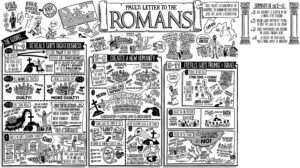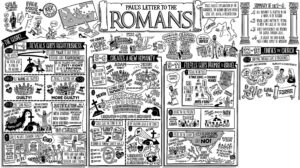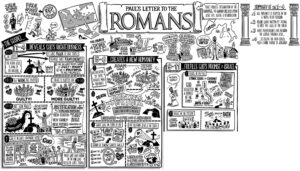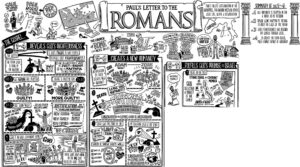Resources
- Romans overview (video): Part 1, Part 2
- Romans is structured as follows:
- Books 1-4: Revealing God’s Righteousness
- Books 5-8: Creating a New Humanity
- Books 9-11: Fulfilling God’s Promise to Israel (Past/Present/Future)
- Books 12-16: Unifying the Church
Romans 13: Unifying the Church
Context
- Romans 13 covers three important points:
- God puts every human authority in place to serve His purposes. This means Christians must submit to them
- We must love our neighbors as ourselves.
- We are called to live as people of the light and throw off works of darkness (drunkenness, sexual immorality, and jealousy).
- Christians are to submit to earthly authorities because God put them there. To improperly resist authority, then, is to resist God (Romans 13:1–2).
- I thought this seemed to contradict other parts of the Bible:
- midwives who wouldn’t kill babies in defiance of the law (Exodus)
- Daniel kneeling down in front of a window and praying in defiance of the law
- Shadrach, Meshach and Abednego won’t bow down to the golden statue despite the king telling them to do so
- In Acts 5:29 Peter says we must obey God rather than any human authority.
- Does Romans 13:1–7 mean civil disobedience is always wrong for Christians? Why would Paul write this?
- Paul knew Caesar was going to read his letter and he wanted to make sure the ruling authorities in Rome would know Christians are not anarchists.
- Here is some helpful guidance from John Piper.
- “Don’t get your back up so easily, because being wronged by a government sends nobody to hell, but being rebellious and angry and bitter and spiteful does send people to hell. And so it is a much greater evil for you to be rebellious than of the government to mistreat you.“
- Christians are called to have a submissive spirit and follow leadership but this is not absolute.
- God defines the limits of leaders and when these limits violate scripture, we are to follow God, not man.
Notes and Discussion
- Once you put your faith in Christ you are justified – one and done.
- How do we interact with our government?
- the word of God tells us what we’re supposed to do
- God is the ultimate authority, regardless of what country or government you live under
- Followers and leaders are accountable to God
- The ones who resist authority are in opposition to God’s command
- This means we shouldn’t disrespect our government leaders even if we disagree with them politically.
- The scripture says if we oppose authority judgment will come upon us.
- God uses government to carry out His good purposes on earth.
- Some governments persecute those who do good. Typically the law breakers have a problem, not the law-abiding citizens.
- Government is God’s servant for your good.
- If you go against the government they can punish you.
- Government is God’s servant. This applies no matter who is in office.
- If the government wants you to do things that go against the scriptures you might be punished by the government since God is the ultimate authority, not government.
- Obedience is a matter of inner convictions as well as external law.
- As believers we serve the highest of all authorities: God Himself.
- Christians are called to have a submissive spirit and follow leadership but this is not absolute.
- God defines the limits of leaders and when these limits are violated or government laws violate scripture, we are to follow God, not man.
- We seemed to focus mostly on the first of the three points that Romans 13 covers. We must not forget the other two points:
- Love our neighbors as ourselves.
- We must live as people of the light and throw off works of darkness (drunkenness, sexual immorality, and jealousy).







